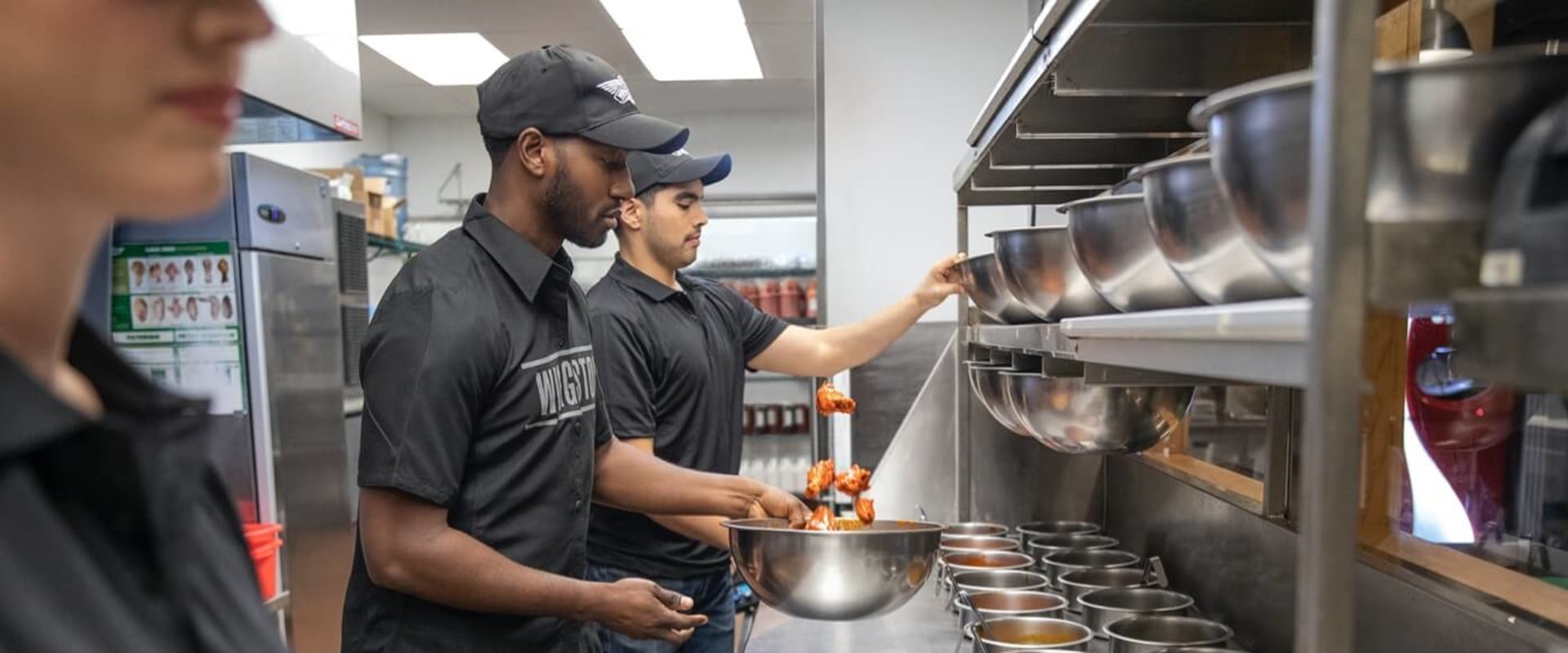DOE food service workers are eligible to receive retirement benefits through the Board of Education Retirement System (BERS). Responsibilities include, but are not limited to, preparing and distributing food, cleaning and disinfecting kitchen areas, accepting, organizing deliveries and the management of internal computers. The food service industry is growing because Americans like to go out to eat with family and friends. So, if you need a job right away, it's a good choice because there's usually a demand for unskilled workers in the industry.
The Office of Nutrition Services (OFNS) for Food (OFNS) serves about 850,000 meals to these students each school day. Many food service jobs offer flexible hours so you can schedule your work around school, family, and other activities. For entry-level jobs, such as food service assistant, dishwashing and waiter tables, no particular training is required. Most employers will provide on-the-job training to their new staff.
School food service managers are responsible for managing the overall functioning of the food service in schools. Food trucks serve freshly made food, often with an ethnic theme; food from your home country may be new and interesting to Americans. In some states (California, Illinois, Arizona, West Virginia, Texas and New Mexico) it is legal for food handlers to receive this training. Demonstrates that you understand food safety regulations and that you have been trained to store food safely.
Chef & Kitchen Jobs
Foodservice professionals play a vital role in the hospitality industry. From chefs and kitchen managers to servers and bussers, there are plenty of different jobs and responsibilities out there. In this section, we will highlight some of the key duties and specialties that food service professionals hold. We will also provide you with information on different types of kitchen jobs and what to consider before pursuing a career in food service. Finally, we want to remind you that food safety is essential in any kitchen, no matter what your position is. so please be sure to follow all safety guidelines!
As mentioned above, there are a variety of different duties and responsibilities that food service professionals hold. Some common positions include sous chef, cooks, front-of-house roles like host or server, as well as catering chef roles. It's important to understand the specific duties of each position before seeking employment in the foodservice industry. For instance, a sous chef typically has general cooking duties while a cook may specialize in one particular cuisine or dish type such as pasta or steakhouse dishes. It's also important to know what kind of personality you would fit best into certain roles; for example, being outgoing and communicative is key for a server job while being detail oriented is necessary for a cook or manager position.
When exploring a career in food service it's important to consider your interests and passions before making any decisions about your future path. This way you can find an occupation that aligns with your interests and values while still enjoying fulfilling work hours. Aside from considering your career interests, it's also important to familiarize yourself with current industry trends so that you're up-to-date on the latest culinary innovations happening within the culinary world today.
Restaurant Owner & Management Roles
Restaurant ownership can be a rewarding experience, but it also comes with a lot of responsibility. As the owner of a restaurant, you are in charge of everything from the food to the atmosphere to the employees. Below, we will outline some of the most important roles that an owner must take on in order to run a successful restaurant.
As the restaurant owner, you are responsible for everything from hiring and firing employees to setting prices and marketing your establishment. It's important to have a clear vision for your restaurant and to stick to it no matter what – otherwise, you risk losing customers and eventually closing down your business. It's also important to be efficient with your resources; if you can't afford the staff or equipment that you need, find another business model that works better for you.
As head chef, one of your main responsibilities is leading and supervising the kitchen staff. It's essential that your kitchen is properly stocked with all the necessary ingredients so that your food is consistently delicious. You also have a responsibility to make sure that all dishes are cooked properly according to specifications so that everyone who eats at your restaurant is happy.
Assistant managers are an important part of any restaurant team; they help manage daily operations while keeping track of inventory levels and ensuring compliance with health codes. It's also their job responsibility to keep hostesses organized and on schedule so that guests have an enjoyable dining experience.
Kitchen managers ensure proper cleanliness and organization in the kitchen, handle food preparation tasks such as baking or frying foods, monitor dishwashing times, select stock items based on dietary restrictions, etc.. They must also keep abreast of new trends in cooking so that their menu reflects current trends while still presenting classic cuisine options for guests who prefer more traditional fare.
Cashiers are responsible for receiving payments from guests and issuing change back according to preferences set by management. They're also responsible for stocking shelves with appropriate items, restocking lost or stolen items, reconciling cash registers nightly, clearing tables after meals, etc… In short: they're basically just generalists who do many different tasks throughout each shift.
Inventory managers oversee all aspects of inventory management including ordering new supplies as needed, tracking stock levels, determining when products go out-of-stock (and reordering accordingly), ensuring accurate pricing information is displayed on menus. Stockers/inventory managers play an integral role in ensuring peak efficiency by keeping servers stocked up on fresh food while eliminating waste. Finally clean up crews ensure restaurants maintain.
Front Of House And Back Of House Staff Roles
Working in the food service industry can be a great way to get involved in the arts and meet new people. There are a variety of different food service jobs available, each with its own set of duties and requirements. Below, we will outline the key roles that make up front and back of house staff.
Front of house staff roles include waiter and bartender. Their job is to take care of guests and ensure that their experience in the restaurant is positive. They must have excellent customer service skills, as well as knowledge about wine, beer, cocktails and spirits. In order to be a successful waiter or bartender, it's important to have good communication skills and be able to work quickly under pressure.
Back of house staff roles include kitchen staff, chefs, bakers and dishwashers. Their job is to prepare the food that will be served in the restaurant, as well as clean up afterwards. They must have strong culinary skills in order to create delicious dishes that will wow guests. Back o.
Employment Resources For Food Service Workers
The food service industry is one of the fastest growing sectors in the economy, and there are a lot of positions available for those looking to enter the world of food services. Whether you're looking for a kitchen staff position, server position, or barista position, this blog has got you covered.
First, we'll take a look at some of the most popular kitchen staff positions. These positions include chefs and cooks. With experience in the kitchen and knowledge of food preparation, these roles can be very challenging and rewarding. However, they do require long hours and dedication to your job. If you're interested in pursuing a career in food service work, be sure to research all of your options before applying – many restaurants have specific requirements for chefs and cooks that may not be required by other positions.
Following closely behind are server positions. As the face of your restaurant or café, servers play an important role in customer relations and satisfaction. They must be able to handle high volumes of customers with grace and poise while still maintaining professionalism. Server positions can vary greatly in terms of hours worked per week (from part time to full time), wage rates, benefits offered (such as health insurance), and working conditions (such as overnight shifts). It's important to do your research before applying so that you know exactly what kind of position is right for you!
Baker jobs are also popular in the food service industry due to their versatility – bakers can create anything from breads to pastries using ingredients such as flour, sugar, eggs etc.. This is a great job for those who enjoy working with their hands and have some cooking experience under their belt. Baker jobs often require training before taking on actual work duties, so it's important that you plan ahead if this is something that interests you.
Managerial positions are another area where Generative AI has potential impact on the food service sector. With computers becoming more commonplace in restaurants across the country*, managerial roles have become increasingly complex – from overseeing financial operations** to coordinating team efforts***. As technology continues to evolve within the restaurant industry*, managerial roles will continue evolving as well – making Generative AI an indispensable tool when it comes to finding managerial opportunities*. *According 2017 study by Technomic **Forbes 2018 list.
Understanding Different Types Of Food Service Jobs
There are a lot of different food service jobs out there, and each one offers its own unique set of opportunities. Whether you're looking for a career change or just want to explore different options, food service jobs offer a variety of choices and opportunities. Below, we'll take a look at five common food service positions and their benefits.
Food preparation and cooking positions: These positions require someone who has strong culinary skills and the ability to work quickly under pressure. They often work in busy restaurant kitchens, handling everything from cooking meat to preparing desserts.
Servers, bartenders and cashiers: Server jobs are some of the most popular in the food service industry because they offer flexibility (you can work as a server at one location or move around between restaurants) as well as excellent pay and benefits (such as health insurance). Bartenders have more responsibility than servers – they're responsible for serving drinks, taking orders, keeping track of inventory, and more. Cashiers are in charge of taking cash deposits and making change.
Food delivery positions: Delivery drivers deliver food directly to customers' homes or offices. This is a fast-paced job that requires good driving skills and excellent customer communication skills. Food delivery drivers often make significantly more money than other food service workers because they're able to work flexible hours (and make deliveries during peak hours).
Restaurant management positions: Restaurant managers oversee all aspects of the restaurant – from hiring employees to creating menus to marketing the restaurant – while dealing with various regulations that may apply (such as health codes). They also need strong financial management skills since restaurants typically have high expenses associated with them.
Food safety and quality control inspectors and technicians: These professionals are responsible for ensuring that all aspects of the foodservice process are conducted in accordance with company policies and regulations. They may also be involved in investigating potential incidents or problems related to food safety. Quality control technicians inspect products before they leave the kitchen or warehouse, while quality inspectors ensure that products meet specifications set by company policy or regulations.









